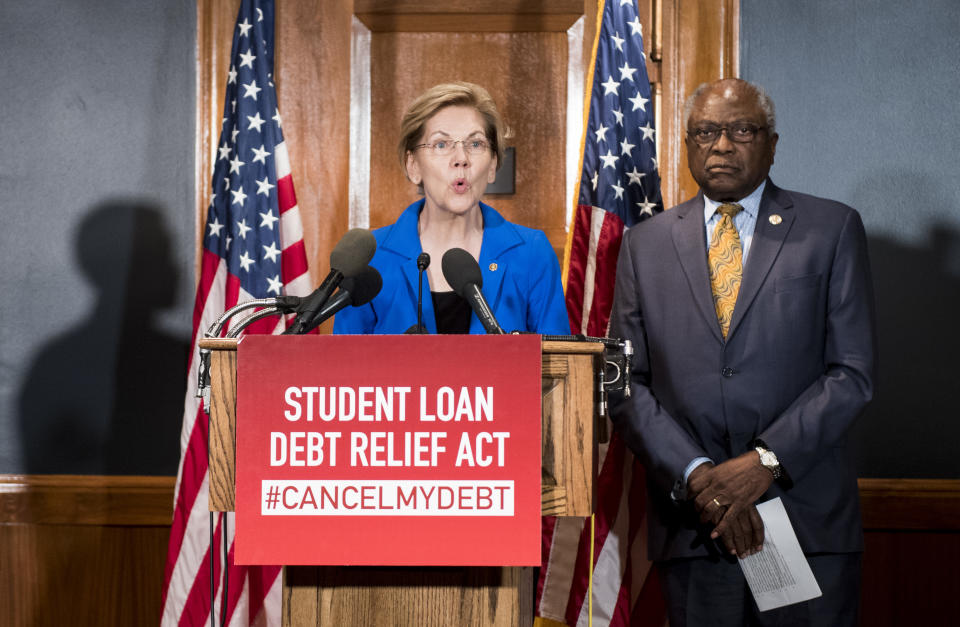Elizabeth Warren says she will cancel 42 million borrowers’ student debt — on Day 1
Presidential candidate Elizabeth Warren doesn’t just want to cancel student debt for 42 million borrowers — she wants to do it on Day 1 of her presidency.
In a new plan released Tuesday, the Massachusetts senator wrote that after years as a policymaker on Capitol Hill, “I learned two key things. First, the student debt crisis is deeper than many experts thought was possible. And second, the Department of Education has broad authority to end that crisis.”
Hence, “we can’t afford to wait for Congress to act,” she added. “So I will start to use existing laws on day one of my presidency to implement my student loan debt cancellation plan that offers relief to 42 million Americans.”
Warren’s accelerated timeline of cancelling student debt for a wide swath of borrowers was noteworthy, experts said, because she was going to give the Education Department much more power to do so.

“What she's saying is that the [Education Department] has some existing authority under law to either modify or cancel student loans, and that she would use that authority to enact a big chunk of her legislative proposal on essentially Day 1 or something close to that,” Ben Miller, vice president for postsecondary education at the Center for American Progress, told Yahoo Finance.
It’s a more “ambitious” interpretation of what the department can do though, he said. “Historically, the full tools of the Department of Education have not been used as much as they should have been. So I think it's interesting,” said Miller.

Warren’s Education Secretary will cancel student debt for 95% of borrowers
American borrowers hold more than $1.6 trillion in outstanding student loans as of November 2019, according to data compiled by the Federal Reserve Bank of St. Louis.
If elected, Warren said she would appoint a Secretary of Education to “modify, compromise, waive, or release ” existing federal student loans to match her student debt cancellation plan, which impacts 95% of borrowers (or 42 million people).
Warren would also direct the secretary to “use every existing authority” to “rein in” for-profit colleges, crack down on predatory lending, and “combat” racial disparities in higher education.
“Systemic discrimination in our broken student loan system has become a significant civil rights issue — the sense of urgency couldn’t be greater,” Student Debt Crisis Executive Director Natalia Abrams told Yahoo Finance. “Warren's plan... shows that presidents can take decisive action to combat racial disparities and restore the value of higher education for those working towards a better, more just future for us all.”
But does an Education Secretary have the right to cancel student loans without congressional approval? Warren and her team seem to believe so.
In a letter supporting her plan, experts from Harvard Law School's Legal Services Center wrote that Warren’s proposal “calls for a lawful and permissible exercise of the Secretary’s authority under existing law.”

They stated that Congress has “granted the Secretary a more specific and unrestricted authority to create and to cancel or modify debt owed under federal student loan programs in the Higher Education Act (HEA) itself,” which then “empowers” that person to “execute the broad debt cancellation plan” that Warren hopes to achieve.
Is this constitutionally possible?
Warren’s plan doesn’t run afoul of the constitution, according to another expert.
"She's proposing to forgive, cancel, compromise away the debt that's held by the federal government. Congress has the power to do that and enacted a statute that permits the Secretary of Education to do that," says Sam Erman, professor at USC Gould School of Law.
Though a would-be President Warren would be issuing the directive of canceling the debt of 42 million borrowers, the actual implementation would ultimately fall to the Secretary of Education. However, that might not be possible on Warren's first day in office.
Presidents often do not have many of their cabinet officials sworn in on week one, let alone day one. Since the Senate confirms cabinet members, Warren might have a Trump administration holdover temporarily filling the role of Secretary of Education, which would most likely not approve a plan of this magnitude.
Erman, who specializes in constitutional law, tells Yahoo Finance that though Warren could issue the order to cancel the federal student loan debt of 42 million borrowers, the relief may not be instantaneous.
“The debt likely would not disappear on day one," he says.
Even if Warren had her Education Secretary confirmed on Inauguration Day, Erman says the directives of a president don’t have to be followed, at least theoretically. One example he brought up was that of former Attorney General Jeff Sessions, who recused himself from the Russia Inquiry much to the chagrin of President Trump.
But Erman doubts that Warren would find herself in a similar situation if elected.
"It's not 100%, especially at the beginning of a term you're going to get someone who's confirmed; you're going to nominate someone whom you think will do what you want. With the issues you can see coming down the pipe, you're pretty likely to choose someone who will agree with you."
‘Permissible under current law’
In the proposal, Warren also details a plan to accelerate student loan discharges for defrauded students, simplify the process for future victims, and fix any damages caused to their credit history.
Current Education Secretary Betsy DeVos has been facing this issue, since she has refused to grant automatic debt discharge for students who attended the now-defunct Corinthian Colleges.

Warren also repeats her call to make student loans easier to discharge in bankruptcy by eliminating “the onerous ‘undue hardship’ standard” that judges have followed for decades.
Incidentally, last week a New York judge discharged a Navy vet’s student debt on the basis that he had demonstrated that he was under “undue hardship.”
America is “facing a student debt crisis, and every day counts for families struggling with this burden and for our economy as a whole,” wrote Warren. “The steps I have outlined here will require clearing a lot of red tape … [but] I have consulted with leading experts on student debt cancellation who are confident that this plan is permissible under current law.”
Warren’s ED pick likely to be a ‘former public school teacher’
While it may be too early to tell who Warren’s pick for ED would be, she has already given us one tiny clue: It’ll be a former public school teacher.
When she previously called out DeVos as the “worst Secretary of Education we’ve seen,” she had promised that she would “make sure the Department of Education actually works for our students and our educators.”
Warren, a former Harvard Law School professor, then said her pick for Secretary of Education will be “a former public school teacher who is committed to public education … A person who understands how low pay, tattered textbooks, and crumbling classrooms hurt students and educators.”
—
Aarthi Swaminathan and Reggie Wade are reporters for Yahoo Finance. Follow them on Twitter at @aarthiswami and @ReggieWade.
Read more:
'I have a chance now to have a life': Navy vet who won watershed student loan ruling tells his story
'Horrendous situation': America's teachers are suing the federal government over student loans
U.S. teachers increasingly struggle to find affordable housing: Study
Presidential candidate Pete Buttigieg: ‘I have six-figure student debt’
Read the latest financial and business news from Yahoo Finance
Follow Yahoo Finance on Twitter, Facebook, Instagram, Flipboard, SmartNews, LinkedIn, YouTube, and reddit.

 Yahoo Finance
Yahoo Finance 